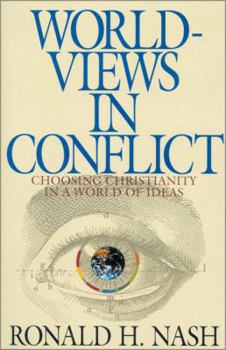Worldviews in Conflict: Choosing Christianity in the World of Ideas
Select Format
Select Condition 
Book Overview
This world is a battlefield in the arena of ideas. The prize is the heart and mind of humankind. In this book, Ronald Nash outlines the Christian way of looking at God, self, and the world. He holds that worldview up against the tests of reason, logic, and experience, particularly discussing the problems of evil and the alleged "nonsense" of the historic Christian doctrines and of Jesus' incarnation and resurrection. He finds the Christian worldview...
Format:Paperback
Language:English
ISBN:0310577713
ISBN13:9780310577713
Release Date:August 1992
Publisher:Zondervan Academic
Length:176 Pages
Weight:0.46 lbs.
Dimensions:0.6" x 5.2" x 7.9"
Customer Reviews
5 ratings
Excellent
Published by Thriftbooks.com User , 16 years ago
This book really helped me see recognize and refine my worldview. It is very good and a very thorough explanation of each of Nash's points. The explanations are good and the content is better. You'll remember reading this one!
Excellent Introduction
Published by Thriftbooks.com User , 19 years ago
This small book is an excellent introduction to worldview thinking from a Christian perspective. It develops Christian ideas in the areas of metaphysics, epistemology & ethics as it portrays a basic outline of a Christian worldview. It also does a good job of introducing basic concepts of logic, and it tackles several supposed contradictions in the Christian faith, particularly the problem of evil. It closes with a comparison of the Christian worldview to two other contenders in the worldview arena, Naturalism and the New Age movement. Highly recommended for those interested in the topic.
Excellent Treatment of a Difficult Topic
Published by Thriftbooks.com User , 22 years ago
This is an excellent book. Ron Nash does a very good job of building up a philosophical apologetic for how to evaluate worldviews/religions/belief systems, and then make comparisons in a meaningful way. There are several things worth noting about this book that are in its favor.Nash starts out by building up a series of 'tests' upon which all worldviews can be evaluated. This is the most important part of the book. Without a standard set of tests that can be applied to any worldview, comparisons between worldviews are probably pointless. There has to be a universal basis upon which to conduct such comparisons, and it's this basis that Nash attempts to erect in the early part of the book. Just as importantly, the tests themselves have to be reasonable, intelligent, and complete. Folks who read the later part of the book in which worldview comparisons are made and don't like what they see when worldviews are compared with each other are likely to try to discredit the standards or tests themselves that are the basis for these comparisons. If the tests don't make sense, or are biased, or are not exhaustive, the worldview comparisons conducted by applying such tests will not carry a great deal of weight with those who don't like the grade their particular worldview gets by applying these tests. So needless to say, the issue of building a comprehensive and objective set of standards by which viable worldview comparisons can be made is the most critical part of the book. And I found that Nash's tests make a great deal of sense and are a legitimate basis upon which to evaluate competing worldviews and draw meaningful conclusions that are relevant to real people.I found that Nash then did a good job of applying these tests. For the purposes of this book, Nash applies his tests to Christianity, naturalism, and the New Age movement. Nash's conclusion is that Christianity passes each test, while both naturalism and the New Age movement have serious problems on almost all fronts. His analyses are not terribly lengthy (more on this later), but they are concise and attempt to highlight a few specific areas of each worldview that tend to be the most controversial or difficult to accept.Nash's analysis accomplishes a couple of things. First, in my view, he demonstrates pretty clearly that the Christian worldview, far from being anti-intellectual and anti-reason, is actually the worldview that best stands up to the processes of logic and reason in comparison with other worldviews. But even if someone doesn't accept this, this book is still a success. In my view, it is virtually impossible to read this book and conclude that these various worldviews are pretty much the same. If nothing else, Nash clearly shows that not only are these worldviews very different from each other, they actually conflict with each other on many fundamental questions. This, in and of itself, is an important thing to demonstrate. An increasing number of people today beli
A great apologetic book!
Published by Thriftbooks.com User , 23 years ago
Nash is awesome! He clearly integrates the apologetic methodology of Clark, Van Til, Schaeffer, Plantinga, Carnell, Henry, Frame, Geisler and other christian apologists in a kind of threefold test for truth. The content of this book is greater than it contains.
The Importance of Thinking in terms of Worldviews
Published by Thriftbooks.com User , 24 years ago
Too many people lack an understanding of their own worldview and how their differences with the conceptual systems (worldviews) of other things hold the key to major disagreements over such issues as religion and politics. This book will give the reader a clear introduction to the importance of worldview thinking.




